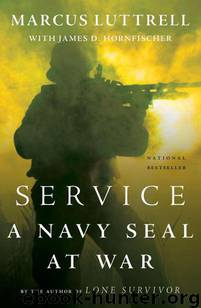Service: A Navy SEAL at War by Luttrell Marcus

Author:Luttrell, Marcus [Luttrell, Marcus]
Language: eng
Format: epub
ISBN: 9780316217255
Publisher: Little, Brown and Company
Published: 2012-05-08T04:00:00+00:00
Pearl Harbor Day was a terrible day in Ramadi. At least ten U.S. servicemen were killed in insurgent attacks. One of those attacks was particularly nasty and costly.
Some American journalists were visiting town that day. They were interested in the story of the Sunni tribal awakening, and they wanted to see it up close, in the street, so a little embed operation was set up to accommodate them. Given the bad press the war had been getting, most of us saw how helpful it could be to have some truth in the papers. Among those members of the press were a twenty-five-year-old woman from a newsmagazine and a photographer who came to see how our work was transforming one of Iraq’s worst places. They were riding Route Sunset in a convoy, bound for COP Falcon. The road was secure, locked down with 24-7 patrols and surveillance. The only vulnerable spot was a road crossing near a newly reopened school. It was there that Al Qaeda managed to insert a bomb team.
An officer riding in the convoy’s second Humvee saw the steel plate buried in the street. He tried to call a warning to the lead vehicle, but it was too late. A heavy rubber tire rolled over it, a fuse triggered, and after a short delay, the third Humvee in line was engulfed in a blast of flames. That vehicle contained four people: a driver, a turret gunner, a Marine Corps public affairs officer, and Captain Travis Patriquin, the Army civil affairs officer whose work with the Sunni tribes had done so much to pacify Ramadi.
The explosion threw Patriquin out of the vehicle. He died on impact. Two others—the gunner, Army specialist Vincent Pomante, and the Marine Corps PAO, Major Megan McClung, were KIA as well. Major McClung became the first female graduate of the United States Naval Academy ever to be killed in action.
Among those who mourned this loss hardest was Sheikh Sattar. Burning with anger and grief, he wept at the news of Captain Patriquin’s death. “For some reason when I make good friends with Americans,” Sattar would say, “they become my brothers, and they die.” The sheikh decided he couldn’t bear making any more American friends. “I don’t want them to die,” he said. At the memorial service for Patriquin, McClung, and Pomante, held several days after Patriquin’s body was flown home—and that was one of the largest “hero flights” anyone in Iraq could remember, attended by more than a thousand people—Sattar offered a traditional Muslim burial prayer to his slain friend. “O Allah, admit him to Paradise and protect him from the torment of the grave and the torment of hellfire. Make his grave spacious and fill it with light.” He also pledged himself to bringing righteous justice to the killers.
Within forty-eight hours, tipped off by a relative, Sattar and his police got the intel that led us to the prize. In a series of raids conducted on December 19, our forces searched for the three assassins who planted that bomb.
Download
This site does not store any files on its server. We only index and link to content provided by other sites. Please contact the content providers to delete copyright contents if any and email us, we'll remove relevant links or contents immediately.
| Action & Adventure | Dystopian |
| Educational & Nonfiction | Erotica |
| Fantasy | Historical Fiction |
| Horror | Media Tie-In |
| Mystery | Religion & Spirituality |
| Romance | Science Fiction |
| Sports | Yaoi & LGBT |
05 Trials of Death by Darren Shan(5837)
Bleach 486 by Tite Kubo(4804)
Naruto 459 by Masashi Kishimoto(3822)
07 Hunters of the Dusk by Darren Shan(3187)
Drawing Cutting Edge Anatomy by Christopher Hart(2691)
Bleach 303 by Tite Kubo(2292)
Bleach 573 by Tite Kubo(2039)
Naruto 353 by Masashi Kishimoto(1821)
The Life-Changing Manga of Tidying Up: A Magical Story by Marie Kondo(1729)
Naruto 651 by Masashi Kishimoto(1681)
Manga Crash Course Fantasy by Mina Petrovic(1562)
Girl In A Million by Betty Neels(1539)
Human Anatomy Made Amazingly Easy by Christopher Hart(1514)
Manga Workshop Characters by Sophie Chan(1506)
Goblin Slayer, Vol. 2 (light novel) by Kagyu Kumo(1481)
Goblin Slayer, Vol. 1 (light novel) by Kagyu Kumo(1480)
Bleach 296 by Tite Kubo(1454)
Bleach 348 by Tite Kubo(1393)
Juni Taisen: Zodiac War by Nisioisin(1328)
